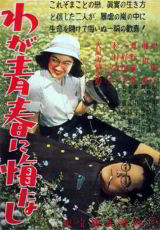 Our film club kicks off 2011 with Kurosawa’s first post-war film, No Regrets for Our Youth (わが青春に悔なし, Waga seishun ni kuinashi), released in 1946. (And not Keisuke Kinoshita’s 24 Eyes, as yesterday mistakenly suggested by the “currently playing” text. We will have 24 Eyes next month.)
Our film club kicks off 2011 with Kurosawa’s first post-war film, No Regrets for Our Youth (わが青春に悔なし, Waga seishun ni kuinashi), released in 1946. (And not Keisuke Kinoshita’s 24 Eyes, as yesterday mistakenly suggested by the “currently playing” text. We will have 24 Eyes next month.)
I have unfortunately been too pressed for time to come up with a proper introduction (I really should work on those in advance), so we will have to do without one for now. I’m sure that won’t be a problem though.
Although No Regrets for Our Youth has been quite extensively discussed by critics, it doesn’t tend to come up in general discussions of Kurosawa’s films. It would therefore be very interesting to hear your general opinions of the film. Do you like it? Do you think that it is an important part of Kurosawa’s oeuvre? What do you think of Setsuko Hara’s lead character? And was Kurosawa really trying to say something here, or was he simply pampering to the American occupation forces?






This is my favorite Kurosawa film.
It is the most challenging of his films for me.